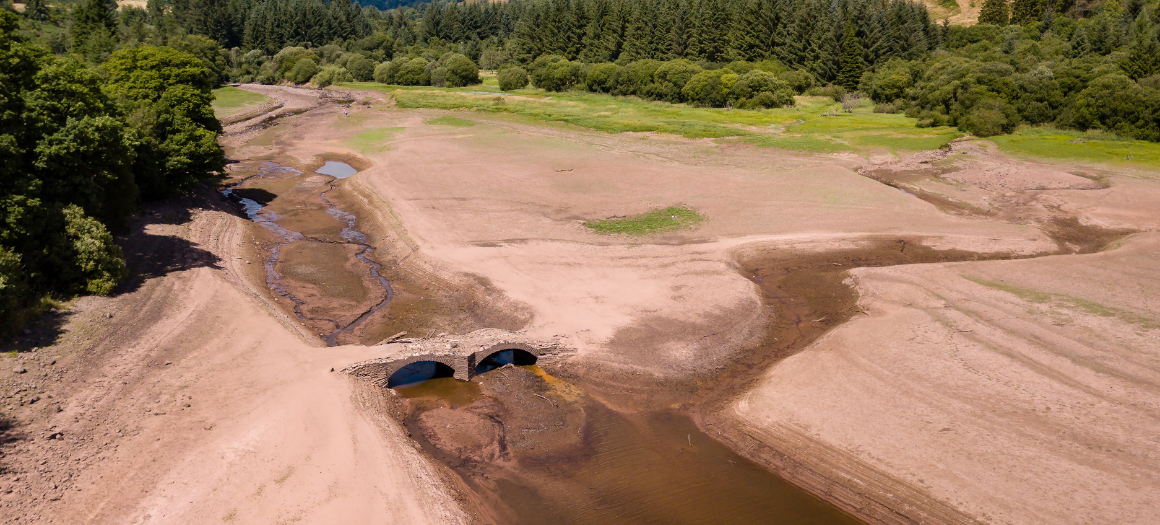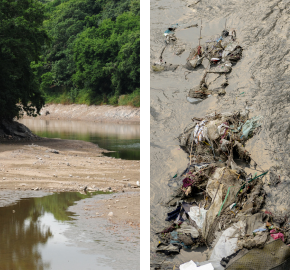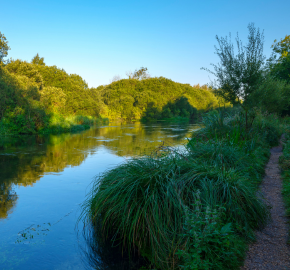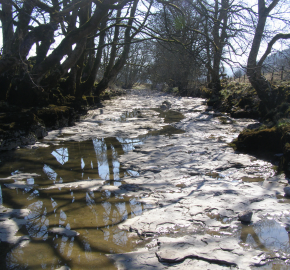What environmental ambition? Water companies’ interpretation of abstraction guidance will come at a cost for wild fish

Water Policy Officer James Overington considers Environmental Destination, yet another muddied process that will allow water companies to delay addressing the environmental impact of their daily operations. If the Environment Agency fails to tighten up its guidance we will see rivers including chalk streams, already diminished by excessive abstraction, vanish for good.
Unsustainable abstraction is the process where the amount of water taken from rivers and groundwater is more than can be naturally replenished. It is a serious and widespread issue that threatens rivers and wild fish across the country.
Water companies plan to continue abstracting water at unsustainable levels for many years to come, despite being made aware of the damage. Their misinterpretation is evident in the latest round of Water Resource Management Plans (WRMP). These plans should set out how companies intend to maintain supply whilst enhancing the environment. Instead, many draft plans seemingly allow water companies to delay making changes to abstraction licences for as long as possible.
The issue and its impact on wild fish
The Environment Agency (EA) estimates that 28.5 billion litres of water (on average) is removed from groundwater and surface water every day, in England, for human use. [1]
Previous water company plans revealed that 700 million litres of water-per-day is unsustainably abstracted, this accounts for 28% of groundwater and 8-18% of surface water abstracted overall. [2]
This quantity of water could replenish the London Aquarium every day – 450 times over.
Climate change and population growth will increase the demand placed on rivers and groundwater. The EA has projected that, by 2050, 2.2 billion litres of water-per-day could be unsustainably abstracted. [3] That figure is equal to the public water use for everyone living in Northern England.
Unsustainable abstraction increases water temperature and the concentration of pollutants. It also makes it harder for wild fish to migrate and complete their life cycles. Flows are reduced meaning sediment builds up and in-river habitats are destroyed.
Addressing unsustainable abstraction
Guidance published by the EA, in 2020, requested that water companies forecast their abstraction reductions to achieve and maintain sustainable abstraction. [4] This concept was termed Environmental Destination. Water companies are required to investigate the impact their abstraction licences are having on the environment by 2030.
A process lacking clarity
Worryingly, guidance on Environmental Destination is repeatedly open to mis-interpretation.
Reducing abstraction poses the greatest threat to several water companies’ supply areas. As a result, many are exploiting the guidelines uncertainty and using it to justify sourcing water from unsustainable abstractions, in some cases for the next 30 years.
There is a particular lack of clarity relating to the location, quantum and date of each projected licence change expected before 2030.
Delay tactics: Wessex Water case study
Wessex Water’s draft WRMP states that they will make no reductions to unsustainable abstractions before 2035 – if that reduction impacts its available water supplies. [5] Its plans show reductions in two phases, the first in 2035 and the second in 2050 (the majority are planned for the second phase). This means, it intends to continue sourcing water from unsustainable abstractions for another 27 years or more.
Wessex are actively choosing to delay making the necessary reductions to unsustainable abstractions. This is despite revealing that it is aware of the damage these abstractions are having on river systems.
Investment in water infrastructure
Wessex could bring this timeline forward if it invested in water supply infrastructure. The only major infrastructure currently proposed by Wessex Water is the Poole effluent reuse scheme which isn’t due to be available until 2050. [6]
Protecting wild fish
To protect wild fish and freshwater, the EA needs to publish clear guidance on the Environmental Destination process, setting out specific requirements for:
1. Incremental reductions to abstractions
Reductions should be made incrementally and based on investigation results. They should not be introduced in phases and postponed for extended periods of time.
2. Greater incorporation into WRMPs
Water companies should shape their plans around reducing abstraction. They should not fit the reductions around distant water infrastructure proposals.
3. Priority reductions
Prioritisation should be given to protected sites and river systems that are vulnerable to abstraction and migratory rivers.
4. Improved timelines
Water companies’ timelines for abstraction reductions need to be brought forward. It is time for water companies and the EA to actually be ambitious.
List of references
[1] Salvidge, R. (2022) “Environment Agency has ‘no idea’ how much water is taken, says whistleblower,” Guardian, 11/11/2023.
[2] Government (2023) Water abstraction statistics: England, 2000 to 2018
[3] Environment Agency (2020) Meeting our Future Water Needs: a National Framework for Water Resources
[4] Environment Agency (2020) Long-term water resources environmental destination: Guidance for regional groups and water companies
[5] Wessex Water (2022) WRMP24 Supply Forecast p.59
[6] Wessex Water (2022) WRMP24 Supply Demand Balance, Decision-Making and Uncertainty




